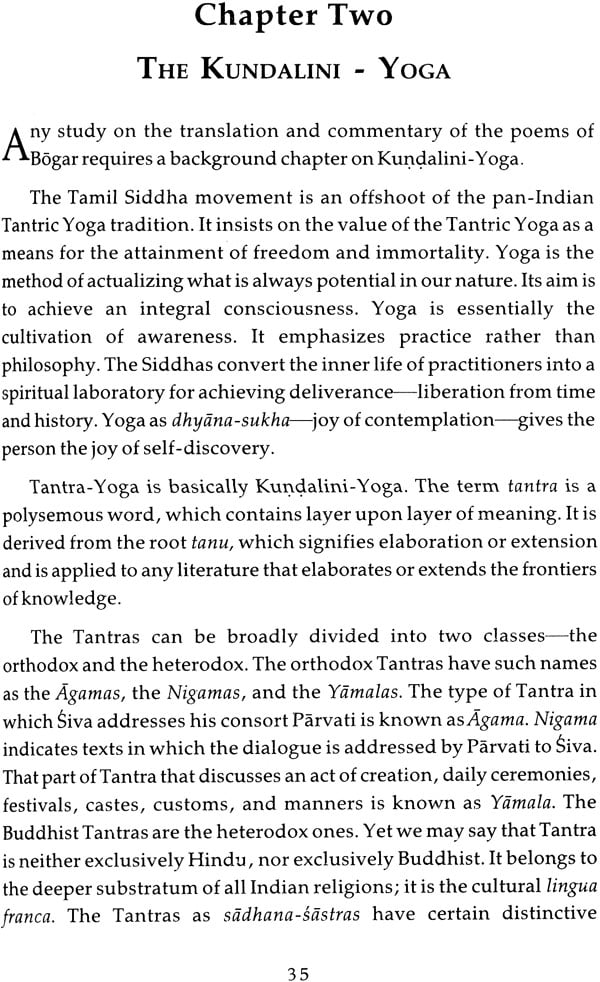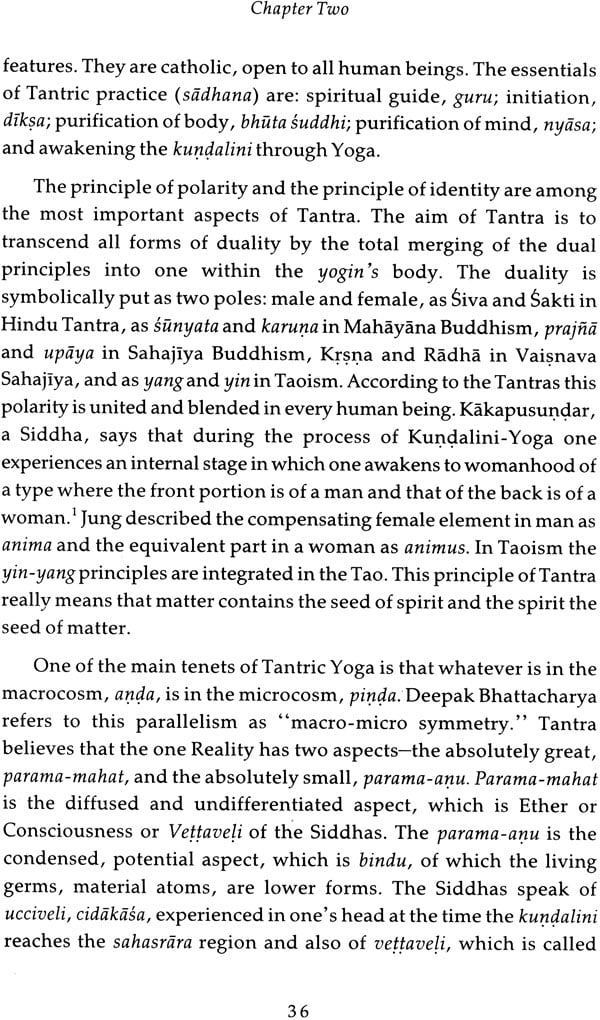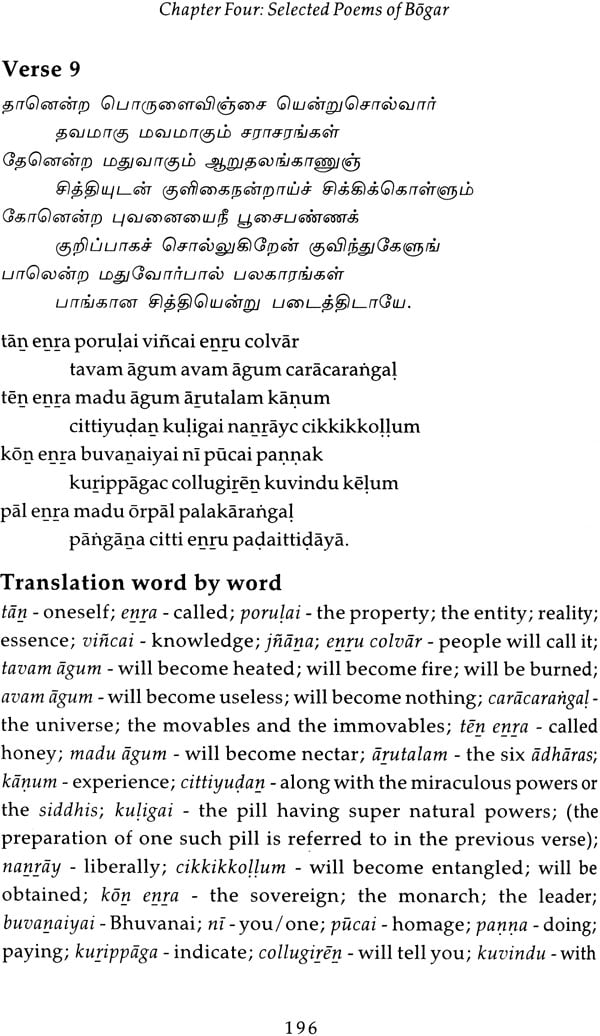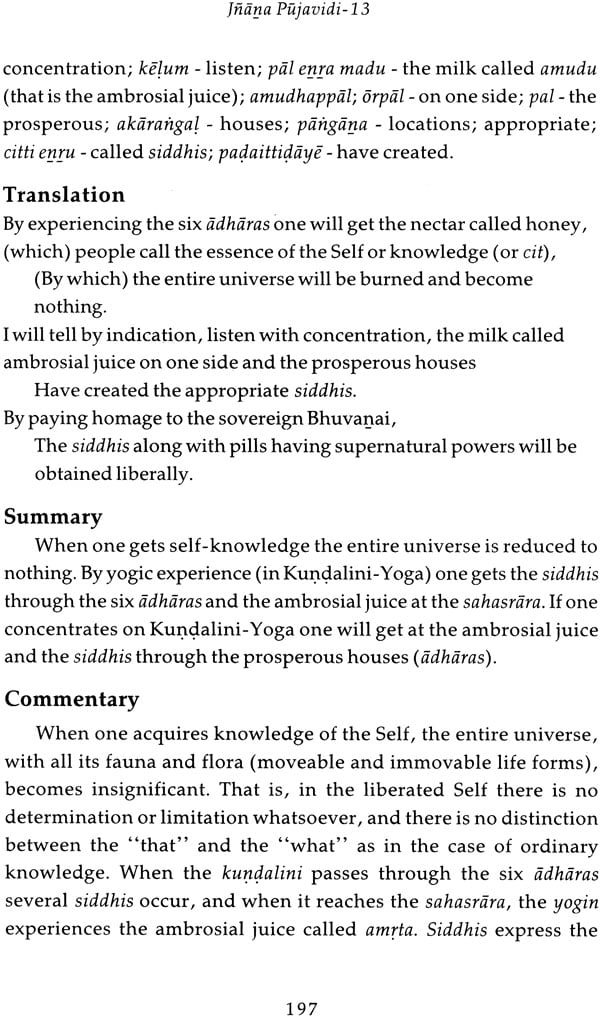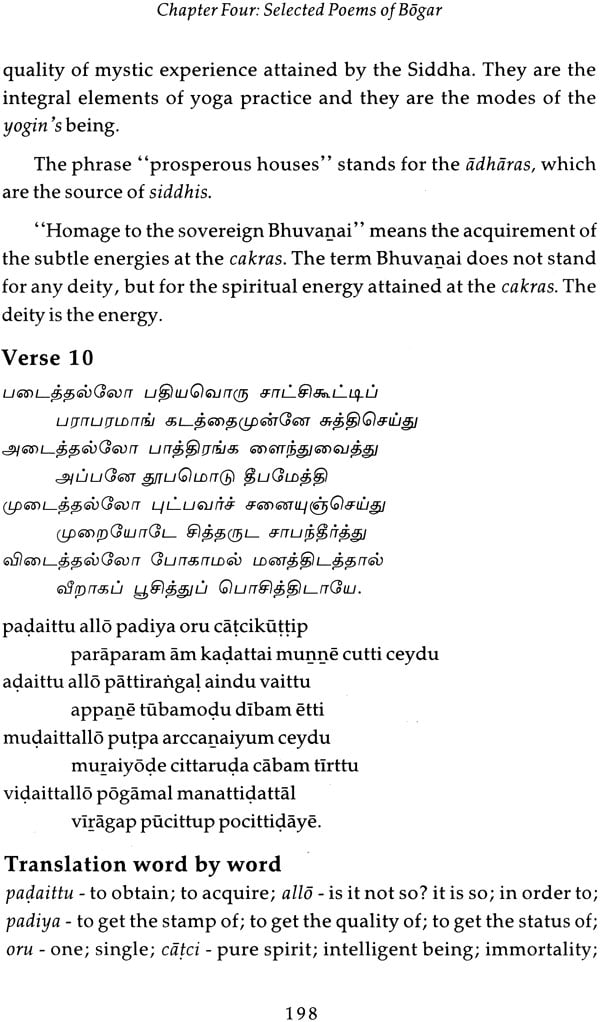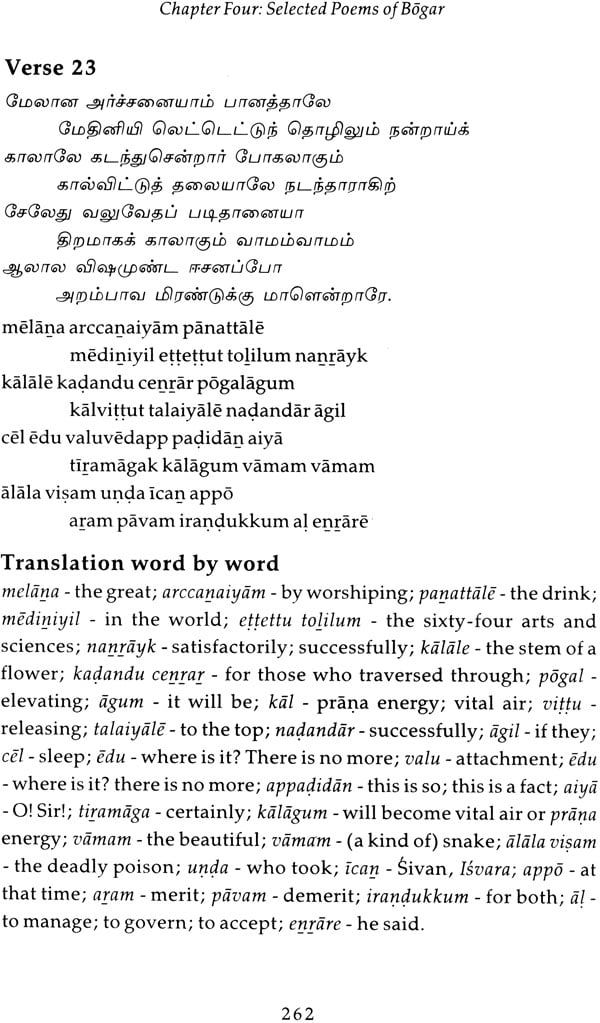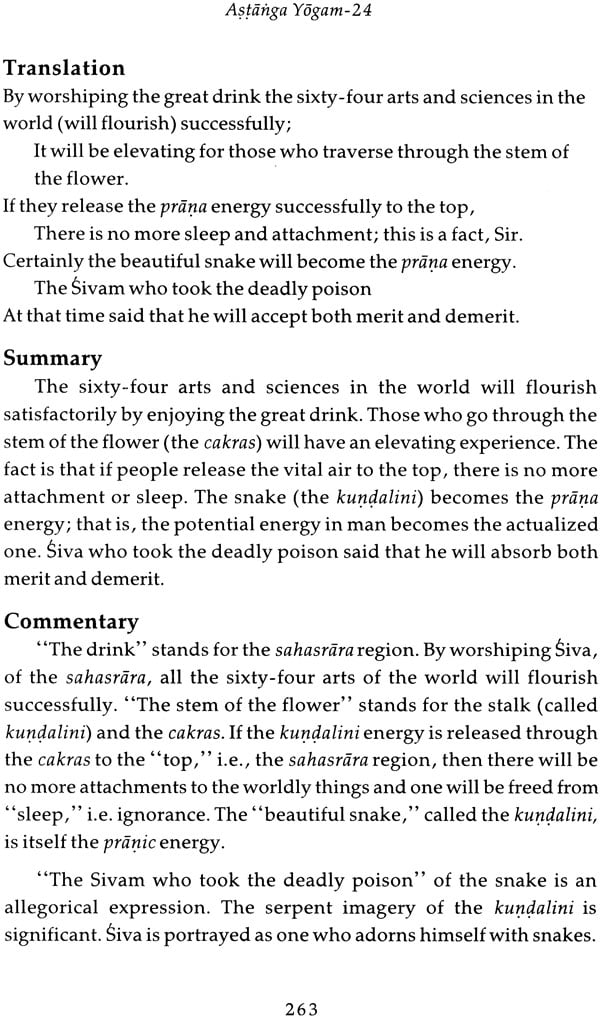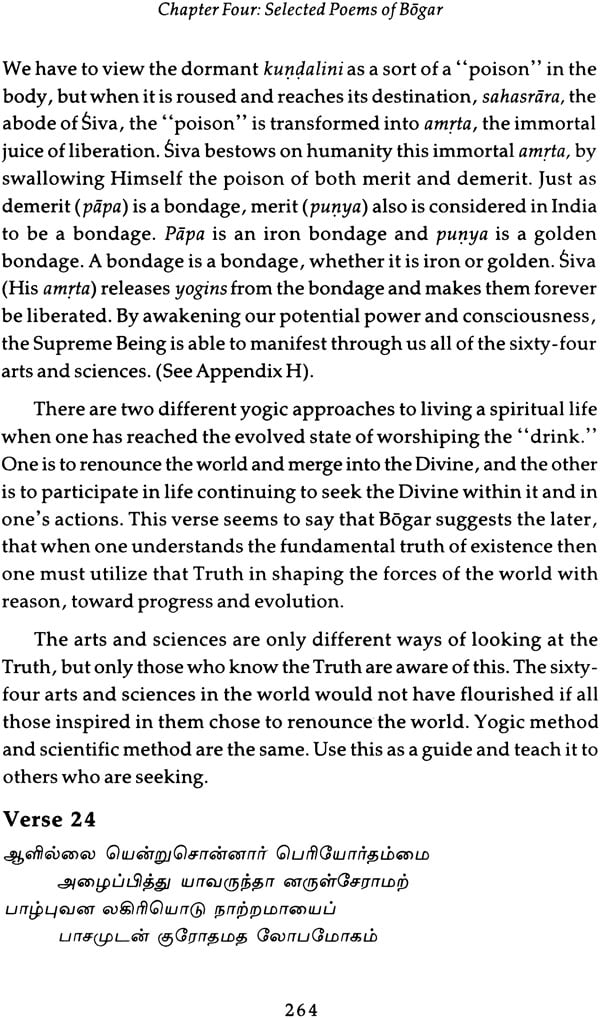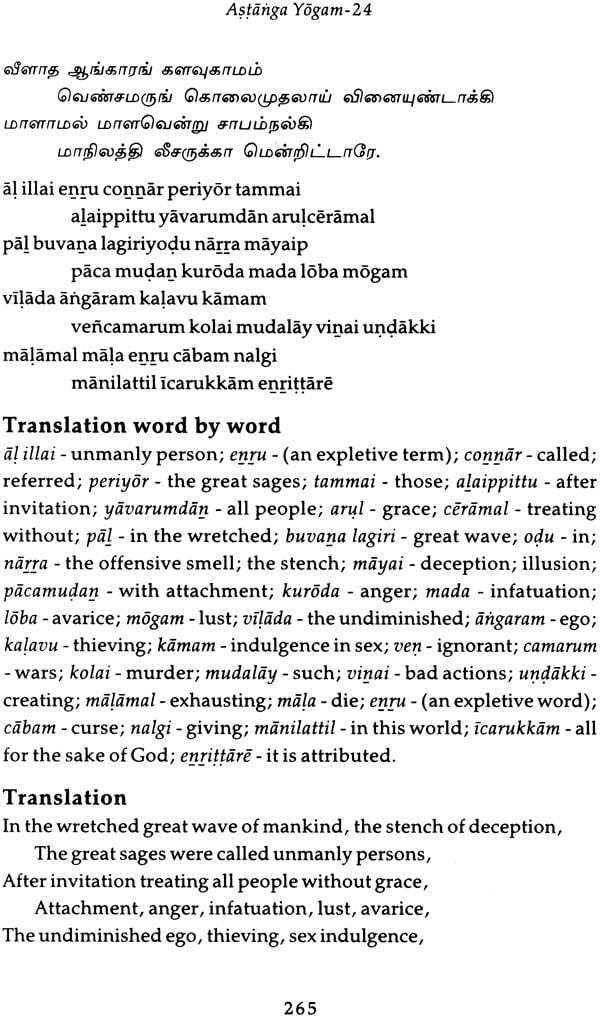
The Yoga of Siddha Boganathar (Volume 1)
Book Specification
| Item Code: | IHL680 |
| Author: | T.N. Ganapathy |
| Publisher: | Babaji’s Kriya Yoga Trust |
| Language: | English |
| Edition: | 2003 |
| ISBN: | 9781895383195 |
| Pages: | 372 |
| Cover: | Paperback |
| Other Details | 8.5 Inch X 5.5 Inch |
| Weight | 500 gm |
Book Description
The Yoga of Siddha Boganathar by T.N. Ganapathy Ph.D. is the first in a series of publications produced by the Yoga Siddha Research Project sponsored by Babaji’s Kriya Yoga Order of Acharayas and Yoga Research and Education Center.
Boganathar was the Siddha Guru of Kriya Babaji Nagaraj the famed Himalayan master. Boganathar lived an extremely long life through the use of alchemical rejuvenation formulate and special breathing techniques. He traveled all over the world chronicled the lives of Siddhas much older than himself and mapped out an illumined path to integral transformation of human nature into divinity. His astounding life provides a shining example of our human potential. Apart from being a highly realized master he also was a great scientist who invented a steamship an automobile a flying machine a parachute and hundreds of medicinal remedies.
The present work provides a biography of Boganathar gleaned form his writings alone. This avoids the distortion of orally transmitted legends. Dr. Ganapathy also conveys the extraordinary challenge of comprehending the esoteric poetry of Boganathar and the Siddhas in General.
The heart of this book is a translation with commentary of seventy five selected poems which serious students of the history of religion and in particular of Yoga and Tantra will find illuminating by meditating upon the verses the reader will be able to draw much inspiration.
This volume contains a word by word translation (with alternative meanings) a literal rendering and an interpretative translation to balance the need for precision and understanding and to facilitate deeper meditative approach to the various layers of meaning of each verse.
The yoga traditions of India have been frequently neglected. This book the first in a new series seeks to remedy this situation, Dr. Ganapathy and his team have labored hard to launce this series and they do so with one of the most illustrious masters of Siddha Yoga Bogar. This volume is a great starting point for exploring the Tantric Yoga of the Siddhas Georg Feuerstein, Ph.D. author of the Shambhala Encyclopedia of Yoga.
Born in the Village of Tandankurai in Thanjavur District Tamil Nadu in the year 1932 and after acquiring his doctorate degree from the Nagpur University in the year 1972 Prof. T.N. Ganapathy retired as Professor and Chairman of the Department of Philosophy Ramakrishna Mission Vivekananda College, Chennai, after thirty nine years of distinguished service as a teacher of philosophy. He has studied the works of the Siddhas since 1975. He was awarded the Senior Fellowship by the Indian Council of philosophical Research New Delhi for three years 1985-1988. His work fir this project on the Philosophy of the Tamil Siddhas was published in the year 1993. Acknowledged as a specialist in Tamil Siddha Philosophy he is at present the Director of the Yoga Siddha Research Center at Chennai India co-sponsored by the Babaji’s Kriya Yoga Order of Acharyas, Inc. Canada and the Yoga Research and education center in California. For this project he has translated the Yoga works of Bogar into English edited the publication of the Yoga of the Eighteen Siddhas: An Anthology the Yoga of Siddha Avvai and is currently preparing a translation commentary and essays on the Tirmandiram.
I am deeply grateful to be able to write a foreword to this fine work by Dr. T.N. Ganapathy Ph.D. a renowned scholar of Siddha Yoga philosophy entitled the Yoga of Siddha Boganathar.
A dozen years ago in 1990 I wrote and published Babaji and the 18 Siddha Kriya Yoga tradition now available in at least ten languages which introduced to the western world the life and teachings of Boganathar the Siddha Guru of Kriya Babaji Nagaraj my own Satguru. My involvement in bringing out the present work actually began in 1980 and 1981, when I supervised the printing of Bogar Kanda Yogam at Chidambaram, Tamil Nadu. This massive work in three volumes contained all of Bogar’s known writings printed in their original Tamil Language on more than 2,000 pages. It had been compiled by my guru Yogi Collecting palm leaf manuscripts containing Bogar’s writings form private sources and libraries. Only the introduction was written in English by Yogi Ramaiah. During the eighteen years I studied with Yogi Ramaiah we mediated regularly on the verses form the writings of Boganathar or another of the eighteen Siddhas. He himself had been blessed with a vision of Boganathar.
Since that time I have longed for the day when the writings of the eighteen Yoga Siddhas including Boganathar’s could be published in English and other foreign languages. In 1992 I published the first international edition of the Tirumantiram written by Tirumular who according to Boganathar was the Guru of his own guru Kalangi. Over the past ten years I wrote the Kriya yoga Sutras of Patanjali and the Siddhas which was published in 2001 and which includes a comparison of Patanjali’s teachings with the Tirumantiram.
Three years ago I founded the Yoga Siddha Research project to preserve evaluate, translate, and publish the writings of the eighteen Siddhas. To date nearly 1,000 palm leaf manuscripts have been copied onto compact disks and an anthology in the English language of selected poems of the eighteen Siddhas with the biography of each is nearing completion.
In late 1999 I came across Dr. Ganapathy’s book the philosophy of the Tamil Siddhas which had been published by the Indian Council of philosophical Research in 1993. earlier they had sponsored his research as a senior fellow for three years form 1985 to 1988. I was impressed with his depth of understanding of the yoga Siddhas and the tremendous amount of information that he had been able to organize in his book. Since early 2000 he has served as the director of the yoga Siddha Research project now supervising the work of four scholars and several technicians in Chennai.
The present book is the first published result of this research project. It is co-sponsored by the Yoga Research and Education Center and Babaji’s Kriya Yoga order of Acharyas which are two nonprofit charitable organization dedicated to research and education in the field of Yoga.
The reader may wonder why I have dedicated so much effort to this work? The answer is quite simple. Boganathar represents for me the best of what we can all aspire to become. He is truly a renaissance man whose deep spirituality and scientific mind may help illuminate our own path. I have practiced intensively Babaji’s Kriya Yoga since 1969 and his writings have been a great source of inspiration of Yoga in general and of Tantra and alchemy in particular. As a great scientist who invented in ancient times a steamship an automobile a flying machine a parachute, and hundreds of medicinal remedies he will interest all clear thinking minds.
By his own account Boganathar lived for thousands of years through the use of alchemical rejuvenation formulate and special breathing techniques. He traveled all over the world, chronicled the lives of Siddhas much older than himself and provided his disciples an illuminated path to self realization and integral transformation of human nature into divinity. He has left several lineages of disciples who continue the Siddha Yoga tradition of India the priests of the Palani temple that he founded in Tamil Nadu and the Taoist tradition of China as well as Babaji’s world wide movement of Kriya Yoga.
Many people have read Paramhansa Yogananda’s Autobiography of a Yogi which first revealed to the Western world the existence of Babaji the immortal Himalayan master who began teaching Kriya Yoga in the middle of the nineteenth century. Yogananda however was unable to reveal any details of Babaji’s origins and very little about how he reached his divine immortal state. Earlier Baird Spalding’s Masters with stories about Christ like masters in India. David Gordon White’s scholarly work the Alchemical Body a historical analysis of the Siddha scriptures primarily in Sanskrit has shed much light on Siddha Yoga and Tantra which too often have been treated in a superficial or sensationalized manner.
The present work provides a biography of Boganathar as we can glean it from his writings alone. This avoids the distortion of orally transmitted legends. Dr. Ganapathy has discussed at length in the present volume how difficult it is to separate fact form fiction in recounting the lives of the Yoga Siddhas. Boganathar’s life is to put it mildly astounding. Not only was it extremely long but it was filled with the kind of accomplishments we associate only with the most advanced Yoga adepts. As such it provides us with a shining example of out human potential.
The present work also provides a translation and commentary of about seventy two selected poems which serious students of Kundalini Yoga and Tantra will find illuminating. Students of Indian Tibetan and Chinese Taoist Tantra will all benefit from a close study of the present work. Students of Kriya Yoga in Particular will recognize many similarities to the techniques that they have learned and so will gain a much deeper understanding of the means and objectives of their own practice. By meditating on the verses the reader will be able to draw much inspiration.
Typically the Siddhas wrote their verses in such a way as to hide the greater part of their teachings form the merely curious. They wrote in what has been referred to as a twilight language that deliberately obscures the deeper meaning from all but the most sincere students. As such they prompt the reader to seek the deepest meanings. The present commentaries are meant to be merely suggestive to point the reader in a direction during meditation insights will follow!
The present work provides a word-by-word translation with alternative meanings as well as literal translation and finally an interpretative translation to balance the need for precision and understanding and to facilitate a deeper meditative approach to the various layers of meaning of each verse.
I highly recommend the yoga of Siddha Boganathar to every serious student of authentic yoga and Tantra as well as to scholars and philosophers. It will inspire you and illuminate your path.
This work the Yoga of Siddha Boganathar is the first volume of the Yoga Siddha Research project sponsored jointly by Babaji’s Kriya Yoga order of Acharyas Inc., Canada and Yoga Research and education Center, California, USA. The purpose of this project is to identify and preserve in computer accessible format all of the manuscripts of the Siddhas related to Yoga in the various libraries and private collections of South India and later on to translate them in English language with commentary. Till now on to serious study has been made about the Siddhas in a systematic and scientific way. No serious attempt has been made to work on or translate the Siddha Poems in Tamil Language. The Yoga Siddha Research project proposes to fill this long left gap.
With this spirit in the background we have ventured to transliterate translate and comment on some of the works of Bogar. For writing the commentary various works of the other Siddhas have also been consulted and made use of. In this sense the commentator has been like a bee sucking from many flowers without becoming a flower. He has also quoted a large number of works in his introductory chapters which does not mean any extraordinary scholarship or research. One does not have to do much research for jewels in a jewellery Shop. In translating Bogar’s works we have used S.A.A Ramaiah’s edition of the complete works of Bogar in five volumes since it does not tamper with the original. In some other editions one finds a tendency to alter the original.
At the end of one’s task comes the compensation of looking back to old scenes and to friends and helpers who have watched the progress of this work. In the first place I bow before the Siddhas for having made me a fit instrument to study and interpret their works. In this connection I bow before Bogar for choosing me to undertake this work which is a great challenge. Let me acknowledge my indebtedness to Babaji’s Kriya Yoga Order of Acharyas USA Inc., Canada and its president Sri Marshall Govindan and to the Yoga Research and Education Center USA and its President Georg Feuerstein for having selected me as the Director of the Yoga Siddha Research project from among the many scholars in Tamil Nadu and having entrusted me with the task of translating and commenting on some of the works of Bogar. I gratefully acknowledge my special thanks to Prof. T.B. Siddhalingaiah who has stepped into my shoes to help me in transliterating the poems of Bogar. Words fail to express my sincere thanks to Walter Neelakantan Secretary Babaji’s Kriya Yoga order of Acharyas trust India for the untiring efforts that he has taken to make this work see the light of the day. I owe a debt of gratitude to Durga Ahlund Marshall Govindan Trisha Feuerstein and Rudra Shivananda who have gone through the manuscript with an electronic eye by providing useful suggestions and comments. Uwe Haardt deserves all appreciations for his cover design. I will be failing in my duty if I do not thank my old student and at present research associate of the Project Thiru Kr. Arumugam, M.A. Ph.D. who helped me in myriad ways in bringing out his volume and has compiled the Appendixes A to D. I am thankful to Sri S.K. Asok Kumar research scholars in Library Science, University of Madras for preparing the index. My late lamented son G. Ravi who has left his sthula sarira (material body) and whom I believe is still with me in his suksma Sarira (Subtle Body) had helped me in computer typing the first three introductory chapters I cherish his memory whenever I go through these chapters. Last but not the least I must thank my wife Smt. Savithri and my having spared me form the household duties and permitted me to pursue this research project without any hindrance from their side.
In writing the introductory chapters to this volume I have drawn heavily on ideas and sentences form my previous book on the Philosophy of the Tamil Siddhas published by the Indian Council of Philosophical Research New Delhi the copies of which are now available with the sponsors. As such this book of mine forms the back drop of the introductory chapters of this volume.
Finally if you find any merit in the book the credit goes to Bogar. And if you find blemishes as I am sure you will please place them squarely on my shoulders of incompetence.
| Foreword | vii | |
| Preface | xi | |
| Notes on Translation | xv | |
| Guide to Pronunciation in Tamil | xvii | |
| Chapter 1 | Introduction: The Basic Difficulties | 1 |
| Chapter 2 | The Kundalini Yoga | 29 |
| Chapter 3 | The Life of Bogar and His Teachings | 53 |
| Chapter 4 | Translation of Selected Poems of Bogar with Commentary | 75 |
| Jnanaccuttiram-1 | 81 | |
| Civayoga Jnanam-12 | 85 | |
| Samadi Diksai-10 | 113 | |
| Tirumandira Jnanam-10 | 129 | |
| Jnana Pujavidi-13 | 153 | |
| Astanga Yogam-24 | 183 | |
| Meyjnana Bodam-2 | 235 | |
| Notes | 241 | |
| Appendix A | Places of Birth of the Siddhas | 255 |
| Appendix B | Longevity of the Siddhas | 257 |
| Appendix C | Month and Birth Star of the Siddhas | 259 |
| Appendix D | Caste and Generation of the Siddhas | 263 |
| Appendix E | Pictures of the Eighteen Siddhas | 265 |
| Appendix F | The Six Adharas as Understood by the Siddhas | 269 |
| Appendix G | Cakras and Anatomical Identifications | 273 |
| Appendix H | The Sixty four Arts and Sciences | 275 |
| Appendix I | Sri Cakra | 279 |
| Appendix J | The Pulippani Tradition | 281 |
| Appendix K | Copper plate Decree | 287 |
| Glossary | 289 | |
| Bibliography | 313 | |
| Index | 331 | |
| About the Author | 355 |
